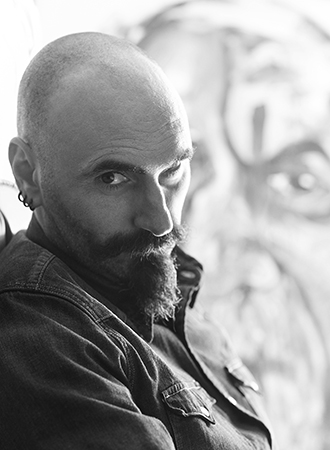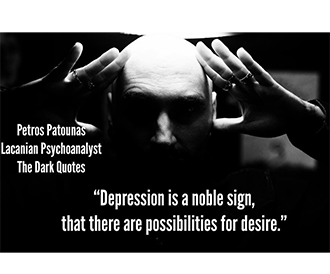The Subject speaks: Regnabo, Regno, Regnavi, Sum sine regno– I am without a realm and register: I am a letter- I am a breath∙ and, to be a breath deriving and omitting its inhalation of that drive which is life, the pass and the object of the Voice ought not to be particularized by the Primus inter pares, who, although not flamboyant in its glowing sophia, his presence fills that void from where desire shall spank its fountain towards a Theoria en-gendered by the Letter’s free will and from the signifier’s repetitive destiny along the devocalizing devitalization of the Other and jouissance: to this desire shall one refer this prayer and to the viscum, that, whatever Thing is oppressive because of its mucilaginous gluttony of the Other’s inertial frame, be that Galilean in its apraxia and doomed into a jouissance of the so called body event but not of the No-Body eventualisation whose activity foreordains the Death Drive, not with a perimeter of what is pleasurable but with a desiraction of what is desirable according to the ethic, that which has been an aim and has enthused into a source in relation to the drive: that my dear friend is not a body event, but a ceremonial to which the body is dedicated to the letters: to that La otra campaña which is not of the Other, for, the Letter seeks to arrive at the Kinesis of a prayer which is not semiotic, towards what, let us remember apostle Paul, he who has symbolized castration and took it away from the flesh and the flesh of the penis, the first symbolizer of the phallus, has proposed it as a prayer that does not cease∙ and if the hesychia is to be brought into the word as an orientation, it is that of the drive, not, not that it does not speak to us, to the analysts, but that it speaks, from its source and not the aim which is imaginary.
And the Subject articulates further, dispiritedly at an im-passe, speaking from the pseudonym educed from the Real’s regurgitate but not the Real itself: and he who has been jawed into the meanings of the structures’ architectural morphology, of faith, belief and knowledge, a mathematical and surely trigonometric compassion that cannot be obsessional because of the third term that makes it celestial, and that is not hypotenuse but hypo-t-Ousia, a true evil for a psychoanalysis to identify with the name of the father and become an idol, and who is a true master of Lacanian text but not of the Ousia of the practice, nom de guerre to the humanism of that epiphany that is brought to audible light by Freud and Lacan and yet it has come to the ears of the dupes as hypocorism: shortened and subtracted by the length of the vowels to accumulate the signifier and the analyst’s comprehension, an epimorphosis to which the death drive’s ignis fatuus rules because of the representation of one for another and to which the salamader’s tail reproduces itself on the level of the Same or of the Other but not the Alien for whom one ought to generate and not contrast- a Sinthome by all means.
And the subject dedicates with honesty the Being Silent to the semblance: to the comfort of a lit de justice, a chair not for analysts but the so called king, shared with his jester, for, it is this action that is not an act forcing the sacrament’s faithfulness of paganism at the demand of the Other to whom the analyst observes from the distance and from knowledge, since, since his body ingurgitates and cannot subsume the consonants of the voice∙ and, it is here that this Ascesis with the letter and the breath mesmerize the digamma of the semblance’s form and not the sound, a metaphor where the gaze speaks but not understood because of its superluminal motion∙ and to this, to this exterior to the eye, which is not of the beholder, the melancholic knows the distance from the body and that mastery to whom life’s drive, which is from death, does not act in necessity with a killing but with the intervention on the Ousia of what components its Aether, which is Apeiron, when it is dissolved from the signifier∙ and when the analyst, that subject who desires, makes its articulation an act, not in the service of the drive that appears as a chosen particle when the subject of the breath mislays its rhythm, as the drive is nothing more than the metric system of the subject’s being, with a scythe for the signifiers’ linearity disabling the Act, unless one not only knows what to do with the Real but also how to reach the Ousia’s first principle, if the dialectic is at the level of the signifier, and that cannot not be nothing but the Other of the Other, which is Zurvanism’s main principle: time: yet it should have been breathing- breathing the Letter.
And the subject calls upon desire with the cardiognosis of the letter and prays, when the Asomatic experience of the epistle creates the flash of the negative mass from which the death drive shall become the analyst’s companion when pointing its desire upon those new uncial shapes of sound: and, from the pallor mortis, a prayer is recited not to a god but to a cause, providing a motion, a Kinesis that, not like any Other though be-cause of a cause, antiphons to the echo of the drive non-echelonical: Quomodo in aquis resplendent vultus prospicientium, sic corda hominum manifesta sunt prudentibus, a desire that is an appeal of the act in the reconnaissance to sustain the entelechy of the Letter and desire, to form not language and neither lalange- but an alphabet that is not a feeling nor meaning, because it is not possessing the body, not a body event, not Επιστήμη but Δόξα∙ for, if a righteous perverse subject reveals something that could have been the nirvana of anxiety, equal to the schizophrenic experience enclaving the corpse in the place, not the name, of the Father, which is not time, to stop the detonation of psychosis, and that until there is the, the either the passage to the act with the use of the fetish, a phallus en-bodied, or the act of a passage in relation to a cause subtracting that which is god∙ in the later crate the phantasm of the fantasy does not exist but created around the ethics of the passage, of the cause and the drive’s own positioning of the subject, a plea of a real nature, whilst, in the first holder it is destroyed as the ethic itself is disavowed by becoming a real act- let us declare it a body event: that body of reference whose Newton’s genius has conceived, is a cause, whose lymphatic system knows how to be a philanderer and flirt with the diaphonic acoustics of the Voice and Kinesis: and if you request to fashion a pass-age of the psychoanalytic Act, a great example of Hylomorphism where the Ousia is contained in mat-ter and not the father, she who is the Sophia of that which will become the function of the Other through the stasis of the signifier and its constant repetition according to the drive’s signification and structure of the subject’s covered areas of action, but not in Plasma that is of the Letter: that is why a prayer is indispensable for the Ascesis of the Psychoanalysts: it is not a body event.

